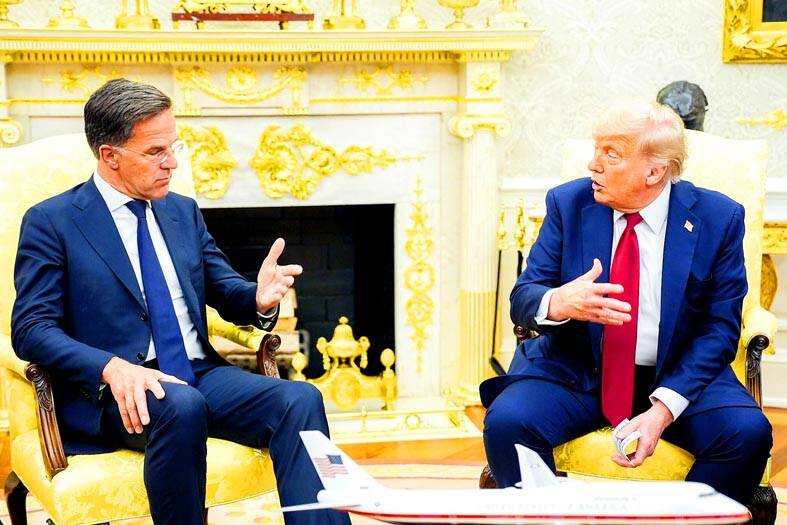Russia yesterday rejected pressure from US President Donald Trump, who threatened to impose stiff economic penalties on Moscow if it does not end hostilities with Ukraine within 50 days — although the Kremlin indicated it would review his latest stance.
“We first and foremost note that any attempts to make demands — especially ultimatums — are unacceptable for us,” state-run Tass news service quoted Russian Deputy Minister of Foreign Affairs Sergei Ryabkov as saying.
Kremlin spokesman Dmitry Peskov said Trump’s statement was “serious,” and Moscow needed time to study it, Tass reported.

Photo: Bloomberg
Trump on Monday said that he would apply levies in the form of “secondary tariffs” if the Kremlin did not cease fighting. He did not provide details, but has used the term in the past to describe duties imposed on countries for trading with US adversaries.
The threats echo punishment spelled out in a bipartisan bill in the US Congress that would impose 500 percent tariffs on countries that buy Russian oil and gas, such as China and India.
“We’re going to be doing very severe tariffs if we don’t have a deal in 50 days, tariffs at about 100 percent,” Trump said during a meeting with NATO Secretary-General Mark Rutte at the White House, where he also promised new weapons for Kyiv.
The US president’s move to put pressure on Russian counterpart Vladimir Putin came after several months of unsuccessfully trying to cajole Moscow into halting its offensive in Ukraine and negotiating a peace deal. Russia has intensified its drone and missile attacks on Ukrainian cities in the past few weeks.
Asked if Trump meant to refer to the more widely known tool “secondary sanctions,” US Secretary of Commerce Howard Lutnick told reporters that sanctions and tariffs were “both tools in his toolbox” and that “you can do either one.”
A White House official said Russia could face both measures if it fails to sign a ceasefire deal by early September.
US Ambassador to NATO Matt Whitaker said the planned action effectively represents secondary sanctions on countries buying oil from Russia.
“It’s about tariffs on countries like India and China that are buying their oil,” he told reporters. “And it really is going to, I think, dramatically impact the Russian economy.”

CHAOS: Iranians took to the streets playing celebratory music after reports of Khamenei’s death on Saturday, while mourners also gathered in Tehran yesterday Iranian Supreme Leader Ayatollah Ali Khamenei was killed in a major attack on Iran launched by Israel and the US, throwing the future of the Islamic republic into doubt and raising the risk of regional instability. Iranian state television and the state-run IRNA news agency announced the 86-year-old’s death early yesterday. US President Donald Trump said it gave Iranians their “greatest chance” to “take back” their country. The announcements came after a joint US and Israeli aerial bombardment that targeted Iranian military and governmental sites. Trump said the “heavy and pinpoint bombing” would continue through the week or as long

TRUST: The KMT said it respected the US’ timing and considerations, and hoped it would continue to honor its commitments to helping Taiwan bolster its defenses and deterrence US President Donald Trump is delaying a multibillion-dollar arms sale to Taiwan to ensure his visit to Beijing is successful, a New York Times report said. The weapons sales package has stalled in the US Department of State, the report said, citing US officials it did not identify. The White House has told agencies not to push forward ahead of Trump’s meeting with Chinese President Xi Jinping (習近平), it said. The two last month held a phone call to discuss trade and geopolitical flashpoints ahead of the summit. Xi raised the Taiwan issue and urged the US to handle arms sales to

BIG SPENDERS: Foreign investors bought the most Taiwan equities since 2005, signaling confidence that an AI boom would continue to benefit chipmakers Taiwan Semiconductor Manufacturing Co’s (TSMC, 台積電) market capitalization swelled to US$2 trillion for the first time following a 4.25 percent rally in its American depositary receipts (ADR) overnight, putting the world’s biggest contract chipmaker sixth on the list of the world’s biggest companies by market capitalization, just behind Amazon.com Inc. The site CompaniesMarketcap.com ranked TSMC ahead of Saudi Aramco and Meta Platforms Inc. The Taiwanese company’s ADRs on Tuesday surged to US$385.75 on the New York Stock Exchange, as strong demand for artificial intelligence (AI) applications led to chip supply constraints and boost revenue growth to record-breaking levels. Each TSMC ADR represents

State-run CPC Corp, Taiwan (CPC, 台灣中油) yesterday said that it had confirmed on Saturday night with its liquefied natural gas (LNG) and crude oil suppliers that shipments are proceeding as scheduled and that domestic supplies remain unaffected. The CPC yesterday announced the gasoline and diesel prices will rise by NT$0.2 and NT$0.4 per liter, respectively, starting Monday, citing Middle East tensions and blizzards in the eastern United States. CPC also iterated it has been reducing the proportion of crude oil imports from the Middle East and diversifying its supply sources in the past few years in response to geopolitical risks, expanding